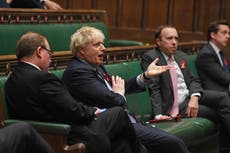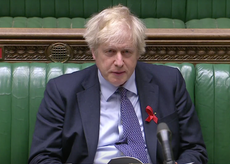The Finance Bill – and what it will mean for Brexit – could be a major headache for Boris Johnson
Some backbench MPs want little less than a rewrite of entire chunks of the Withdrawal Agreement

Your support helps us to tell the story
From reproductive rights to climate change to Big Tech, The Independent is on the ground when the story is developing. Whether it's investigating the financials of Elon Musk's pro-Trump PAC or producing our latest documentary, 'The A Word', which shines a light on the American women fighting for reproductive rights, we know how important it is to parse out the facts from the messaging.
At such a critical moment in US history, we need reporters on the ground. Your donation allows us to keep sending journalists to speak to both sides of the story.
The Independent is trusted by Americans across the entire political spectrum. And unlike many other quality news outlets, we choose not to lock Americans out of our reporting and analysis with paywalls. We believe quality journalism should be available to everyone, paid for by those who can afford it.
Your support makes all the difference.It was barely a year ago that Conservative Brexiteers were voting to pass the latest version of the Withdrawal Agreement into UK law. The backbench rebellion by the European Research Group (ERG) had been so successful that it had deposed a prime minister and replaced her with one of their own ilk.
ERG chairman Jacob Rees-Mogg had been elevated to the Cabinet and even those who remained on the backbenches, such as Steve Baker, now supported the government’s Brexit plan. When that breaking of the parliamentary impasse was followed by a large Tory majority at the general election, it seemed like the Brexit stalemate had been put to bed once and for all.
But now, against a backdrop of political chaos over Covid-19 restrictions, old wounds are being reopened and last year’s battle lines are being faintly redrawn. Earlier this year, when the Internal Market Bill landed with a tired thump on the floor of the House of Commons, it became clear that those left behind in the ERG after Boris Johnson’s ascension to the throne were, in fact, not entirely content with what was contained within his Withdrawal Agreement.
Andrew Bridgen said in September that “we will need amendments to the Finance Bill too, otherwise we will have to enforce EU tariffs between the UK and Northern Ireland.” Referring to the debate over the Internal Market Bill, he said: “This is only the opening salvo of what I hope will become a roaring thunder.” With news of the tabling of the Finance Bill next week, that storm is beginning to gather, as we dive head-first back into the monotonous, repetitive, unconstructive Brexit trade discourse that we thought we had left in 2019.
One of the many criticisms levelled at the government by various members of the opposition late last year was that Parliament was not given enough time to properly scrutinise the Withdrawal Agreement in its newest incarnation before being made to vote on it, under cataclysmic political pressure.
Those concerns were dismissed by the ERG at the time as Remoaners doing what they do best – trying to obstruct the passage of Brexit legislation. In the year since, the tables have quietly flipped, as the ERG now finds itself wanting to slow things down and interrogate the details more closely.
The problem was that so few people at the time believed that the government would be both able and willing to secure any Brexit deal at all. Even among those who might once have been Boris Johnson’s most loyal supporters – One Nation Tories – support for the government collapsed, with 21 Conservative MPs finding themselves expelled from their party and some of their most prominent names, including Amber Rudd and the prime minister’s brother, Jo Johnson, resigning their ministerial posts.
Even Brexiteers in Parliament seemed so surprised that a Brexit deal had been reached that they pivoted to unconditionally supporting it, worried it might somehow slip away again if they waited too long. Now the Finance Bill seeks to rewrite some of the key tenets of that same Withdrawal Agreement they wholeheartedly supported towards the end of last year.
The details of the Finance Bill won’t become clear until it is published in full, but it is expected to include changes to the Withdrawal Agreement provisions on trade, VAT and supply chains. Although any elements to override the Withdrawal Agreement may be cut if a deal is reached with the EU before it is tabled.
According to the standards laid out by the ERG during Theresa May’s premiership, the Withdrawal Agreement as it stands grants an unacceptable level of power to the EU over the movement of goods within the UK (between Great Britain and Northern Ireland). The Finance Bill hopes to rectify that by effectively giving the government the power to override some clauses of the Withdrawal Agreement, especially the clause allowing the EU to decide which goods are “at risk” and therefore subject to European tariffs.
At the moment, backbench Tory rebels are throwing all their weight behind opposition to the new tiered coronavirus restrictions system. The Brexit debate is subdued for now because ERG members believe that the government shares their concerns. That could become a problem for Johnson. Expectations for the Finance Bill are very high. Backbench Brexiteers are expecting little less than a rewrite of entire chunks of the Withdrawal Agreement.
If the bill does not include all the elements now being trailed in the media – which is entirely possible, given that tense trade negotiations are ongoing in Brussels – Brexiteers will feel betrayed once again.
If those uncompromising ERG members feel that the government has gone back on its pledge to maintain the integrity and sovereignty of the United Kingdom in its post-Brexit trade provisions, there will be fireworks in parliament and we will find ourselves –once again – stuck in stalemate on the Westminster front.





Join our commenting forum
Join thought-provoking conversations, follow other Independent readers and see their replies
Comments